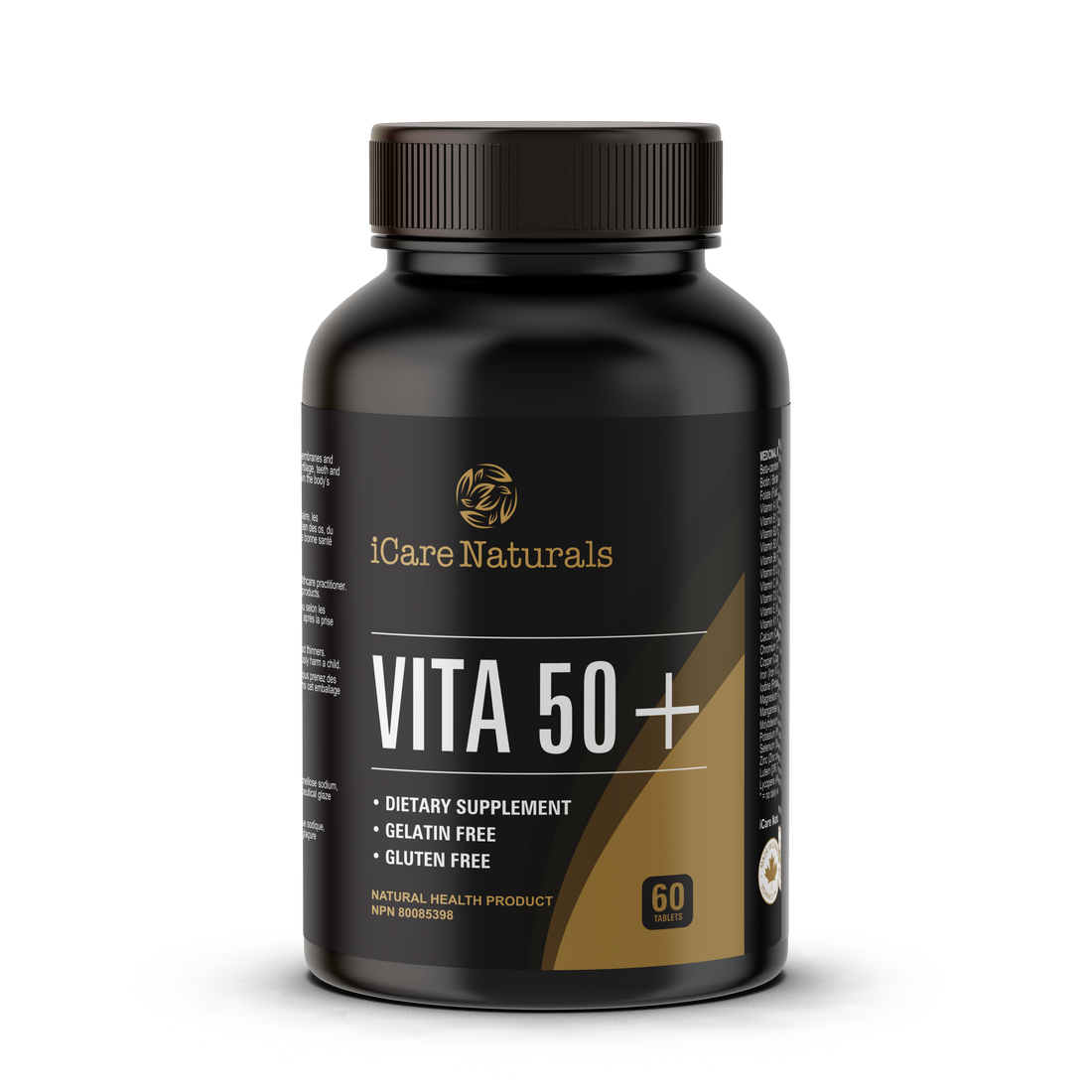Multivitamins have become a primary focus in many Canadian households. These supplements promise a convenient solution to bridge nutritional gaps and promote overall health for individuals who can not get proper nutrients from food sources.
There are shelves at pharmacies and online stores full of multivitamin options tailored for men, women, children, and seniors. But do multivitamins work? Do they really help cover all your nutritional needs?
In this blog post, we have discussed multivitamins' benefits, limitations, and practical considerations.
What Are Multivitamins and Why Do People Take Them?
Multivitamins are common dietary supplements that combine essential vitamins and minerals, often with other helpful nutrients, into one easy form, like a pill or capsule. These tiny powerhouses are crucial for our bodies to work properly and stay healthy.
These multivitamins help our immune system fight off sickness. They also turn our food into energy and keep our bones, skin, and eyes in good condition. Every vitamin or mineral has a specific purpose, and when combined with a multivitamin, they aim to give a broad spectrum of support and keep us fit.
Many individuals choose to take multivitamins to meet their nutritional needs. We understand how tough it can be to consistently eat a perfectly balanced diet that provides all the nutrients your body needs in a hectic world.
If we eat processed meals due to our busy schedules or do not have access to a wide range of fresh foods, we usually miss out on essential vitamins and minerals. If that's your case as well, then taking multivitamins from iCare Naturals to help fill those potential nutritional gaps is the perfect and smart move!
Beyond simply filling gaps, people take multivitamins for various reasons and to support different health goals. They are often used to enhance overall well-being and deal with specific health concerns. Here are some common reasons individuals must incorporate multivitamins into their routine:
Immune System Support: Many individuals take them to help their body's defence system stay strong, especially when colds and flu are common.
Energy Levels: Multivitamins are best for those feeling tired or sluggish, and might help improve energy production and reduce fatigue.
Specific Body Functions: Vitamins like D and minerals like calcium can support healthy bones. Vitamin A is good for vision. For healthy skin and hair, take B vitamins and other nutrients to see an improvement.
Addressing Special Needs: Certain life stages or dietary choices have unique nutrient requirements. For example, pregnant women often use prenatal multivitamins with folic acid, older adults might need more Vitamin D and B12, and people following vegetarian diets may need to take supplements to ensure they get enough B12 and iron.
Coping with Lifestyle Factors: Stress, certain health conditions, or even some medications can increase the body's need for particular nutrients, making multivitamins a helpful addition.
Do Multivitamins Deliver on Their Promises?
Multivitamins are widely available and very popular, promising everything from boosting energy to supporting overall health. But do these daily supplements live up to their widespread reputation? And do they really claim to cure any disease?
The scientific picture isn't entirely clear when considering multivitamins for general health and preventing serious diseases. Numerous studies show mixed results. Some findings suggest that multivitamins do not benefit cancer or other heart diseases.
However, you can take multivitamin supplements for healthy bones, hair, nails, and skin. You can also take these supplements for a healthy immune system, to balance high blood pressure, to improve your heart health and nervous system, and more.
For most people who already consistently take multivitamins, it's essential to know that multivitamins are usually considered safe when taken exactly as recommended on the label. The risk of harm is relatively low. For most individuals, these capsules or tablets act as a useful nutritional safety net, especially if their daily meals aren't always perfect and might be missing specific vital nutrients.
Multivitamin Benefits for Specific Groups
While the general population might see limited benefits from multivitamins, they offer several benefits to specific groups of people:
For Expectant Mothers
Pregnant women often receive clear advice from their healthcare providers to take prenatal multivitamins. These supplements are carefully formulated to provide crucial nutrients, including folic acid.
Folic acid is vital for a baby's early development. It also lowers the risk of low birth weight and premature delivery.
For Individuals with Special Diets
People who are on a restricted diet, such as vegetarians or those with various food allergies, can find multivitamins incredibly helpful.
It's obvious that the diets of such individuals may naturally lack specific nutrients, like vitamin B12, which is found mainly in animal products. Low levels of iron or calcium can also impact their overall health. So, if you have a strict diet plan or are a vegetarian, taking multivitamins is a smart way to prevent further deficiencies.
For Senior Citizens
As we age, our bodies usually absorb fewer nutrients. This is one significant reason elderly people experience nutritional deficiency and might have different dietary needs.
Multivitamins specifically manufactured for seniors can be beneficial for providing extra vitamin D and calcium. They help maintain their bones and prevent conditions like osteoporosis.
Limitations to Consider When Taking Multivitamins
Multivitamin supplements are a great way to improve your overall health by providing external nutrients in the form of capsules, tablets or soft gels. But there are several limitations and considerations you need to understand before you start taking multivitamins daily:
Not a Food Replacement: Multivitamins are not a substitute for a healthy diet. Experts widely agree that whole foods provide a complex mix of nutrients, fibre, and beneficial plant compounds (phytochemicals) that no multivitamin can replicate.
Not Working Overnight: Multivitamins are not a magic bullet for chronic disease; they do not work overnight. They may help prevent deficiencies, but you must use them consistently without missing or skipping them intentionally.
Do not Take Too Much: Taking very high doses of certain vitamins, such as vitamins A or E, can actually be harmful over time. It's crucial to always choose multivitamins that provide nutrients of the recommended daily allowances. Choosing mega-doses can harm your body in several ways. For example, if you take 50mg of Zinc daily, you may experience stomach aches or loose stools. So, it is always essential to consult a professional before starting any multivitamin.
Conclusion
Multivitamins offer practical nutritional support and provide peace of mind, especially for individuals who experience dietary challenges or are going through specific life stages like pregnancy or old age. These supplements are beneficial for maintaining healthy bones, hair, nails, and skin. They also help improve heart health and keep the nervous system balanced.
However, these supplements should always be considered a complement to, rather than a replacement for, a healthy diet and a balanced lifestyle. You must consider your body's nutritional needs before investing in any multivitamin. You can always consult a healthcare expert on whether multivitamin supplementation is proper for you.










